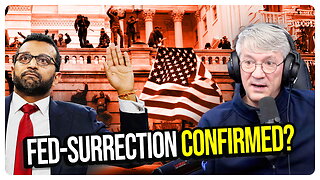Premium Only Content

5 Dangerous Ideologies Creeping into the Church
Alisa Childers blog: https://www.alisachildersblog.com/blog/5-signs-your-church-might-be-heading-toward-progressive-christianity
Be aware if these 5 dangerous ideologies that are creeping in and invading the American church.
Progressive Christianity is a dangerous ideology and will lead people straight to hell!
Progressive Christianity is a theological movement that embraces a more inclusive, questioning, and socially engaged approach to faith. It tends to emphasize:
Inclusion – Welcoming all people, including LGBTQ+ individuals, into full participation in the church.
Social Justice – Advocating for marginalized groups and addressing issues like poverty, racism, and environmental stewardship.
Questioning and Exploration – Encouraging critical thinking, embracing doubt, and valuing science and historical scholarship in understanding the Bible.
Non-Literal Interpretation of Scripture – Viewing the Bible as a human, historical document that contains spiritual truths rather than a strictly inerrant text.
Focus on Love and Compassion – Prioritizing the teachings of Jesus on love, grace, and justice over dogmatic beliefs or legalism.
Progressive Christianity often contrasts with more traditional or evangelical approaches, especially regarding doctrine, biblical interpretation, and social issues. Would you like to explore specific aspects of it?
Big Eva: "Big Eva" is a colloquial term used to describe the large, mainstream evangelical industrial complex—basically, the influential network of megachurches, celebrity pastors, Christian publishers, conferences, and organizations that shape modern evangelical culture.
Key Aspects of "Big Eva":
Celebrity Culture – Well-known pastors, authors, and speakers (like John Piper, Tim Keller, Beth Moore, etc.) who influence evangelical thought and trends.
Publishing & Media – Large Christian publishers (Zondervan, Crossway, etc.), conferences, podcasts, and social media personalities that distribute evangelical teachings.
Megachurch Networks – Influential churches like Hillsong, The Gospel Coalition, and others that set theological and cultural norms for evangelicalism.
Criticism – Some argue that "Big Eva" prioritizes brand-building, book sales, and influence over theological depth or accountability.
It's often used critically, especially by those who feel evangelicalism has become too corporate, compromised, or focused on personality-driven leadership.
Social Justice instead of biblical justice:
The terms social justice and biblical justice share common concerns for fairness and care for the oppressed, but they have key differences in their foundations, methods, and ultimate goals.
1. Social Justice (Secular Perspective)
Foundation: Rooted in human philosophy, political theory, and activism. Often shaped by secular ideologies like liberalism, Marxism, and critical theory.
Goal: Achieving fairness, equity, and systemic change in society regarding race, gender, wealth, and power disparities.
Methods: Policy changes, activism, protests, education, and advocacy to reform institutions and laws.
Authority: Human reasoning, societal consensus, and legal systems.
2. Biblical Justice (Christian Perspective)
Foundation: Rooted in God’s character and commands as revealed in Scripture.
Goal: Upholding God’s moral law, righteousness, and mercy in both individual lives and communities.
Methods: Personal transformation, church involvement, charity, and living according to biblical principles of justice and mercy.
Authority: God’s Word (e.g., Micah 6:8, Isaiah 1:17, Proverbs 31:8-9).
Key Differences:
Aspect Social Justice Biblical Justice
Source of Morality Human activism God’s law and righteousness
Main Goal Equity and systemic change Righteousness and divine justice
View of Sin Social structures and oppression Personal sin and systemic evil
Ultimate Solution Policy changes and activism Gospel transformation through Jesus Christ
Are They Compatible?
Many progressive Christians integrate social justice into their faith, seeing it as part of loving their neighbor.
More traditional Christians argue that social justice (as defined by modern culture) can conflict with biblical teachings, especially regarding identity, morality, and authority.
Some advocate for "Gospel-centered justice", which aligns with biblical principles while addressing real-world injustices.
-
 LIVE
LIVE
Nikko Ortiz
2 hours agoArena Breakout Better Than Tarkov? - Rumble LIVE
135 watching -
 LIVE
LIVE
GritsGG
6 hours agoDuos! Most Wins in WORLD! 3680+!
126 watching -
 1:45:18
1:45:18
Kim Iversen
2 hours agoSnake Eyes to Charlie Kirk: Is Life Copying this Hollywood Script?
34K36 -
 1:05:24
1:05:24
TheCrucible
3 hours agoThe Extravaganza! EP: 44 (9/29/25)
102K8 -
 1:39:07
1:39:07
Redacted News
3 hours agoThe FBI's Charlie Kirk assassination story has fully collapsed as new details emerge | Redacted News
156K138 -
 1:15:20
1:15:20
vivafrei
6 hours agoLive with The Blaze's Steve Baker: Jan. 6 Fed-Surrection and Patel's Clarification Adds Confusion!
173K42 -
 LIVE
LIVE
Futures Edge: Finance Unfiltered with Jim Iuorio and Bob Iaccino
4 hours ago $1.34 earnedSeptember Surge: What It Means for Q4
67 watching -
 1:41:57
1:41:57
The Quartering
5 hours agoMotive In Church Attack Revealed, Dangerous Walmart Food Kills, Eric Adams Out & More
174K51 -
 1:18:04
1:18:04
The Trish Regan Show
4 hours agoBREAKING: NFL Picks Anti-Trump Rapper Bad Bunny for Super Bowl—Risking MASSIVE Fan Boycott!
36.7K13 -
 45:18
45:18
Stephen Gardner
5 hours ago🚨EXPOSED: Real reason Trump preparing for war - Tulsi Gabbard WARNS Trump!!
46.5K45